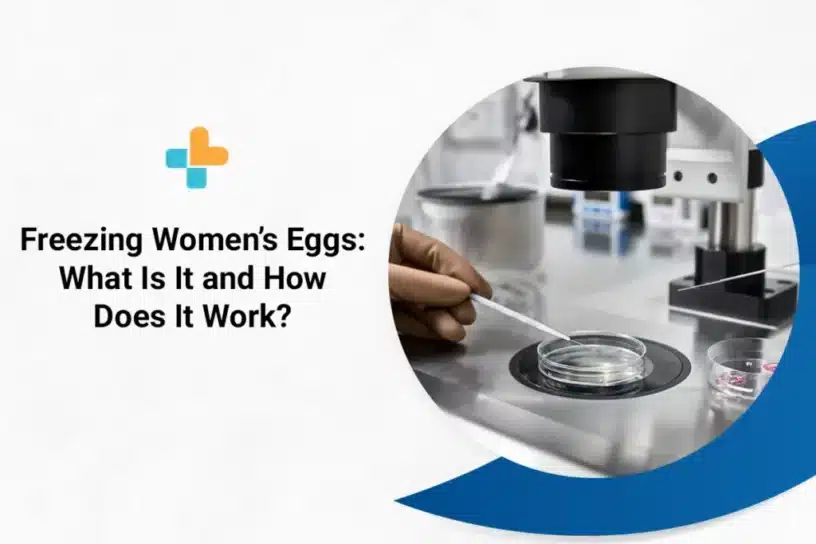People have had to give up their professional and personal lives to have children early because they fear their chances of becoming pregnant will decrease as they get older. What if we told you that you can reschedule your pregnancy without risking your chances?
The success rate of women achieving pregnancy drops significantly between the ages of 30 and 40, and menopause, which occurs in women between the ages of 48 and 55, is the endpoint beyond which pregnancy is not possible. This puts a lot of pressure on women to have children in their prime i.e., the 20s and early 30s. If you are someone who can relate to this situation, you need to know about the egg freezing, what it is and how it works.
What does freezing women’s eggs mean?
Freezing women’s eggs, sometimes called mature oocyte cryopreservation, is a technique for preserving a woman’s ability to conceive in the future. The eggs (oocytes) of a woman are retrieved, frozen, and stored to preserve reproductive potential in women of reproductive age.
Buying time to start a family is not the only reason why one would consider this option. Oocyte cryopreservation is beneficial for women for a variety of reasons. Others who might opt for this procedure include:
- Women who are undergoing chemotherapy and/or pelvic radiation therapy.
- Surgery that could potentially cause damage to the ovaries
- Women with ovarian diseases
- Genetic mutations that might require removal of the ovaries
For some women, the option to freeze eggs might be a life-changing decision. However, doctors warn that this option may not be suitable for everyone, particularly because egg freezing is not a simple procedure and does not guarantee pregnancy in the future.
The process for freezing eggs
Once you are medically cleared to undergo this procedure, you will have to do hormone treatment to stimulate the production of eggs. The more the eggs, the better the chances of pregnancy. This hormone therapy normally requires a woman to inject herself with hormones at home between one and three times a day.
During hormone therapy, your doctor will perform regular blood tests to monitor the effects of hormone treatments. The woman undergoing the procedure will also have at least one ultrasound to detect ovulation and to assess egg development.
When the eggs are ready for retrieval, the extraction process is started. The doctor uses a needle to extract the eggs from the ovarian follicles when they have matured. In most cases, the doctor will utilize ultrasonography to guide the procedure. If the eggs aren’t visible during ultrasound imaging, the doctor may have to remove them via abdominal surgery.
Once the eggs have been extracted by the doctor, it must be frozen as quickly as possible. This is also an extremely delicate procedure that needs to be handled with caution.
When you wish to use your stored eggs in the future, they’ll be thawed, fertilized by a sperm in a controlled environment in a lab, and implanted in your uterus or the uterus of a gestational carrier (surrogate).
Frequently asked question
What is the freezing eggs success rate?
Depending on your age at the time of egg freezing, your odds of becoming pregnant after implantation range from 30 to 60%. The older you are when you freezing women’s eggs, the less likely you are to concieve or have a live birth in the future.
Is there a egg freezing age limit?
Women who want to freeze their eggs should do so as soon as possible. The majority of clinics cater to women under the age of 40. Women between the ages of 40 and 49 are restricted at some clinics.
What are the risks for freezing eggs?
Small risks of ovarian hyperstimulation syndrome (enlargement of the ovaries and fluid accumulation in the pelvis and belly), infection, and bleeding related to the egg harvesting technique is possible.
All in all the procedure is ultra safe and beneficial to women who are looking to concieve in the future but are unsure in the present. Ensuring freezing women’s eggs are in the best condition and shape also ensure healthy offspring. If you are interested in getting this procedure done or have any further queries that were left unanswered, speak to our expert doctors at Ayu Health. Then Ayu Health may be your best bet! You can also visit our website to book an appointment or call us at +91 – 6366 100 800 for a consultation.
Also Read : Top 10 Iron-Rich Foods to Eat During Pregnancy: A Complete Guide
Our Hospital Locations
Gynaecology Surgery Hospitals in Chandigarh | Gynaecology Surgery Hospitals in Bangalore | Gynaecology Surgery Hospitals in Jaipur | Gynaecology Surgery Hospitals in NCR | Gynaecology Surgery Hospitals in Hyderabad
Our Doctors
Gynaecology Surgery Doctors in Chandigarh | Gynaecology Surgery Doctors in Bangalore | Gynaecology Surgery Doctors in Jaipur | Gynaecology Surgery Doctors in NCR | Gynaecology Surgery Doctors in Hyderabad
About the Author

Dr. S. Goel
Dr. S. Goel is a renowned Internal Medicine Specialist currently practicing at Ayu Health, Bangalore. He is a Specialist in Internal Medicine, Diabetes HTN, Paediatric Care, and Family Medicine.




